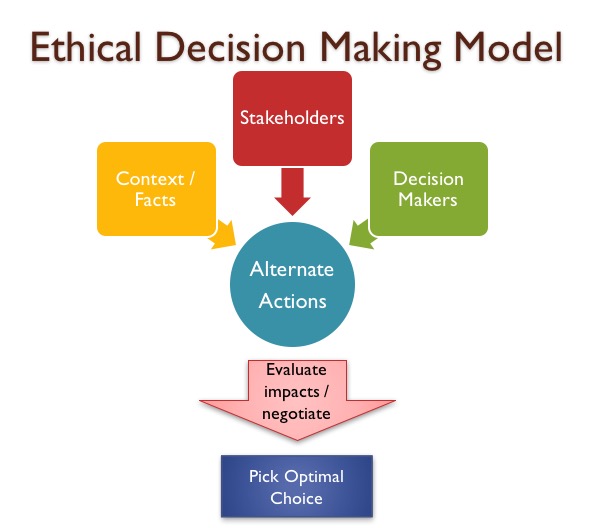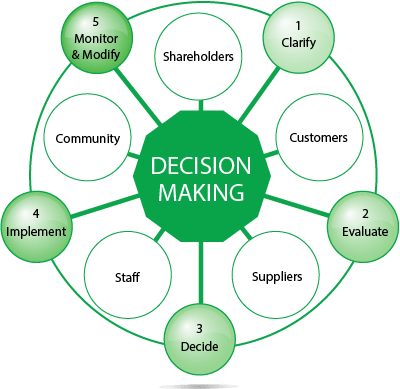Welcome to our guide on ethical decision making in business! In today’s fast-paced and ever-evolving world, the importance of ethical practices in business cannot be overstated. As consumers become more conscious of the impact their choices have on society and the environment, businesses need to prioritize ethical decision making to build trust, maintain credibility, and ultimately succeed in the long run. In this article, we will delve into the principles and practices that can guide businesses towards making ethical choices that benefit not only their stakeholders but also the greater good.
Ethical decision making in business is a multifaceted process that requires a deep understanding of the principles that underpin it. From the perspective of a business, it involves evaluating the potential impact of decisions on various stakeholders such as employees, customers, suppliers, and the wider community. By considering the ethical implications of their choices, businesses can align their actions with values such as fairness, integrity, transparency, and accountability. It’s not just about following regulations and laws; it’s about going above and beyond to make a positive difference.
In this guide, we will explore the key principles that should inform ethical decision making in business, such as the utilitarian approach, the deontological approach, and the virtue ethics approach. We will also discuss practical strategies and best practices that businesses can adopt to ensure ethical decision making becomes an integral part of their organizational culture. So, if you’re ready to embark on a journey towards ethical excellence in the business world, let’s dive in and discover how to navigate the complex terrain of ethical decision making together!

A Guide to Ethical Decision Making in Business: Principles and Practices
Ethical decision making is a crucial aspect of running a successful business. In today’s society, consumers are more conscious about the ethical practices of the companies they support. Therefore, it is important for businesses to prioritize ethical decision making to maintain a positive reputation and gain the trust of their customers. In this article, we will explore the principles and practices that guide ethical decision making in business.
The Importance of Ethical Decision Making
Ethical decision making serves as the foundation for a business’s integrity and credibility. When businesses prioritize ethical practices, they not only demonstrate their commitment to doing what is right, but they also create a positive work environment for their employees. Ethical decision making also helps businesses avoid legal issues and financial penalties that can arise from engaging in unethical practices.
One of the main reasons ethical decision making is important is because it builds trust with customers. Consumers are more likely to support businesses that operate ethically, as they want to align themselves with companies that share their values. By making ethical decisions, businesses can attract and retain loyal customers who believe in their commitment to social responsibility.
Principles of Ethical Decision Making in Business
1. Transparency: Transparency is a key principle in ethical decision making. Businesses should be open and honest in their operations, providing clear and accurate information to both employees and customers. This includes disclosing any potential conflicts of interest and being transparent about the environmental and social impacts of their actions.
2. Fairness: Fairness is another important principle in ethical decision making. Businesses should treat all stakeholders, including employees, customers, and suppliers, with fairness and equity. This involves offering equal opportunities, fair wages, and fair competition in the market.
3. Responsibility: Businesses have a responsibility to society and the environment. Ethical decision making involves considering the impact of business practices on the community and the planet. This may include implementing sustainable practices, supporting local communities, and minimizing the use of harmful substances.
4. Accountability: Accountability is crucial in ethical decision making. Businesses should take responsibility for their actions and be willing to be held accountable for any negative consequences. This involves admitting mistakes, rectifying them, and implementing measures to prevent similar issues in the future.
Practices for Ethical Decision Making in Business
1. Code of Conduct: Developing and implementing a comprehensive code of conduct is essential for ethical decision making in business. This code should outline the ethical standards and expectations for all employees and stakeholders. It should address issues such as conflicts of interest, bribery, discrimination, and environmental responsibility.
2. Ethical Training: Providing ongoing ethical training to employees is crucial for fostering a culture of ethical decision making. This training should educate employees about the company’s code of conduct, ethical principles, and the potential consequences of unethical behavior. It should also provide guidance on how to handle ethical dilemmas.
3. Ethical Decision-Making Frameworks: Implementing ethical decision-making frameworks can help guide employees when faced with difficult choices. These frameworks provide a step-by-step process for evaluating the ethical implications of a decision and determining the best course of action. Common frameworks include the Utilitarian Approach, the Rights Approach, and the Virtue Ethics Approach.
4. Whistleblower Protection: Establishing a whistleblower protection program encourages employees to report unethical behavior without fear of retaliation. This enables businesses to address and rectify unethical practices promptly.
In conclusion, ethical decision making in business is crucial for maintaining a positive reputation, gaining the trust of customers, and avoiding legal issues. By prioritizing transparency, fairness, responsibility, and accountability, businesses can create a culture of ethical decision making. Implementing practices such as a code of conduct, ethical training, decision-making frameworks, and whistleblower protection further support ethical decision making in business. By following these principles and practices, businesses can navigate ethical dilemmas with integrity and make decisions that benefit both their stakeholders and society as a whole.
Key Takeaways: A Guide to Ethical Decision Making in Business
- Always consider the impact of your decisions on others.
- Follow ethical principles such as honesty, integrity, and fairness.
- Be aware of conflicts of interest and avoid them.
- Seek multiple perspectives and gather all relevant information before making a decision.
- Regularly review and update your ethical practices to ensure continued adherence.
Frequently Asked Questions
Here are some common questions about ethical decision making in business principles and practices:
1. What is ethical decision making in business?
Ethical decision making in business refers to the process of making choices that align with moral principles and values in a business setting. It involves considering the impact of decisions on various stakeholders, such as employees, customers, suppliers, and the community, and making choices that prioritize integrity, fairness, and responsibility.
Business ethics guides individuals and organizations in determining the right course of action in situations that involve potential ethical dilemmas. It helps establish a framework for decision making that promotes ethical behavior, transparency, and accountability in business practices.
2. Why is ethical decision making important in business?
Ethical decision making is crucial in business for several reasons. Firstly, it helps build trust and credibility with stakeholders, including customers, investors, and employees. When businesses consistently make ethical choices, they create a positive reputation and attract loyal customers and talented employees.
Moreover, ethical decision making contributes to long-term success and sustainability. Businesses that prioritize ethical practices are more likely to avoid legal issues, reputational damage, and financial losses associated with unethical behavior. Ethical decision making also fosters a positive work environment and promotes employee morale and engagement.
3. What are the key principles of ethical decision making in business?
There are several key principles that guide ethical decision making in business:
Integrity: Acting with honesty, transparency, and consistency in all business dealings.
Respect for stakeholders: Considering the impact of decisions on employees, customers, suppliers, and the wider community.
Fairness: Treating all individuals and groups equitably and without bias.
Accountability: Taking responsibility for the consequences of decisions and actions.
Sustainability: Making choices that consider the long-term impact on the environment and society.
4. How can businesses incorporate ethical decision making into their practices?
Businesses can incorporate ethical decision making into their practices by:
Establishing a code of ethics: Developing a set of guidelines and standards that outline expected behaviors and ethical practices.
Providing ethics training: Educating employees about ethical decision making, ethical dilemmas, and the importance of ethical behavior in the workplace.
Encouraging open communication: Creating an environment where employees feel comfortable reporting ethical concerns and seeking guidance.
Conducting ethical audits: Regularly reviewing business practices to identify any areas that may be prone to ethical risks or conflicts of interest.
5. What are the potential consequences of unethical decision making in business?
Unethical decision making in business can have serious consequences, both for the individuals involved and the organization as a whole. Some potential consequences include:
Legal issues: Engaging in unethical practices can result in legal action, fines, and damage to the company’s reputation.
Reputational damage: When a business is associated with unethical behavior, it can lose the trust and loyalty of customers, investors, and other stakeholders.
Employee disengagement: If employees perceive unethical behavior within the organization, it can lead to decreased morale, job dissatisfaction, and higher turnover rates.
Loss of business opportunities: Other businesses may choose not to engage in partnerships or collaborations with companies known for unethical practices.

Final Thoughts: Principles and Practices for Ethical Decision Making in Business
As we conclude this guide on ethical decision making in business, it is important to reflect on the principles and practices that can help organizations navigate the complex landscape of ethical dilemmas. Making ethical choices is not always easy, but with the right framework and mindset, businesses can uphold their values and contribute to a more ethical and sustainable world.
First and foremost, businesses should prioritize integrity and transparency. By being open and honest in their operations, companies can build trust with their stakeholders and create a culture of ethical behavior. Additionally, incorporating ethical considerations into the decision-making process is crucial. This involves evaluating the potential impact of decisions on various stakeholders, including employees, customers, communities, and the environment.
Furthermore, businesses should establish clear ethical guidelines and codes of conduct that align with their values. These guidelines should be communicated effectively to all employees and serve as a compass for decision making. Regular training and education on ethical practices can help employees navigate ethical dilemmas with confidence and ensure consistent ethical behavior throughout the organization.
In conclusion, ethical decision making in business is a continuous process that requires commitment and vigilance. By embracing principles such as integrity, transparency, and stakeholder consideration, businesses can foster a culture of ethics and contribute to a more sustainable future. Let us remember that every decision we make has the power to shape the world around us, and by choosing ethics, we can create a better tomorrow for all.